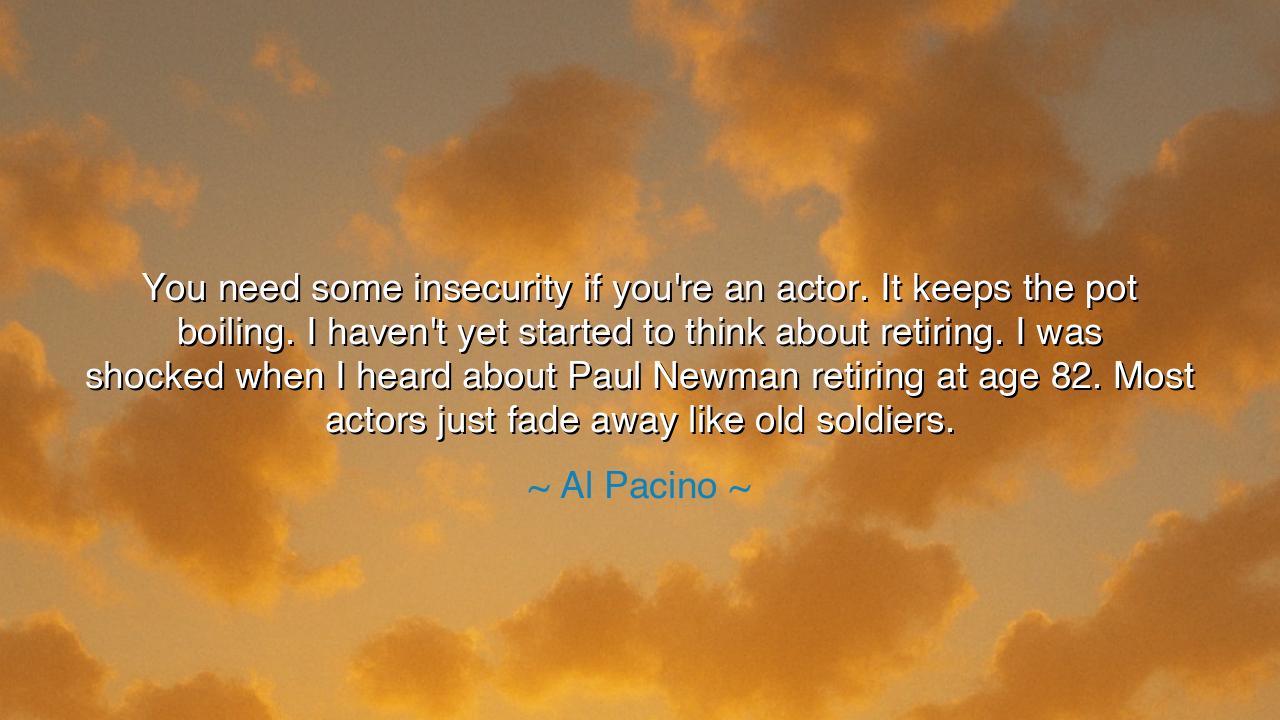
You need some insecurity if you're an actor. It keeps the pot
You need some insecurity if you're an actor. It keeps the pot boiling. I haven't yet started to think about retiring. I was shocked when I heard about Paul Newman retiring at age 82. Most actors just fade away like old soldiers.






"You need some insecurity if you're an actor. It keeps the pot boiling. I haven't yet started to think about retiring. I was shocked when I heard about Paul Newman retiring at age 82. Most actors just fade away like old soldiers." These words, spoken by the iconic Al Pacino, offer a profound reflection on the nature of insecurity, creativity, and the pursuit of art. Pacino, who has spent decades immersed in the world of acting, recognizes that a certain sense of insecurity—a kind of humble self-doubt—is essential for maintaining the fire of creativity. It is this insecurity that keeps an actor engaged, that prevents them from growing complacent, and that drives them to continually reinvent themselves in the pursuit of excellence. Pacino’s shock at Paul Newman’s retirement serves as a reminder that the art of acting is not just a job, but a lifelong pursuit, one that demands passion, dedication, and a willingness to confront one’s own limitations, even as one ages.
In the ancient world, the concept of insecurity was not seen as a weakness but as a vital force for growth and self-awareness. The Greeks, with their deep understanding of human nature, often spoke of the tension between a person’s inner doubts and their outward confidence. In Socrates’ philosophy, the unexamined life was one that lacked growth and purpose, for it was in questioning one’s own beliefs and actions that true wisdom was attained. Similarly, Pacino’s statement reveals that insecurity is not something to be feared, but something to be embraced—an essential part of the creative process that keeps an actor, or any artist, vibrant and alive in their craft.
Consider the ancient hero, Achilles, whose journey was marked not only by physical battles but by deep inner conflict. Achilles' sense of insecurity—his struggle between pride and vulnerability, honor and rage—was the very thing that made him a figure of both tragedy and glory. His insecurity drove him to seek perfection, to prove himself in ways that ultimately led to both his greatest victories and his most destructive flaws. In much the same way, Pacino acknowledges that an actor’s insecurities are not weaknesses but forces that propel them toward self-discovery and mastery. It is through facing these internal doubts and challenges that an artist finds their true strength.
This idea of creative insecurity is mirrored in the life of Leonardo da Vinci, who, despite being one of the most brilliant minds in history, was often plagued by doubt. He struggled to complete many of his works, constantly revising, revisiting, and questioning his creations. Yet, it was this very self-doubt that led him to push the boundaries of art, science, and invention. Leonardo’s persistent insecurity drove him to produce masterpieces that would endure through the ages. In the same way, Pacino’s reflection reveals that insecurity, rather than being a burden, is the fuel for an actor’s lifelong pursuit of excellence and growth.
The notion of retirement that Pacino discusses also speaks to the sacred duty of the artist. For Pacino, the idea of retiring—of stepping away from the craft that has defined his life—feels unnatural. Paul Newman, despite his advanced years, chose to leave the stage, but for Pacino, there is no final curtain. Acting is not just an occupation, but a calling, one that transcends age and time. Shakespeare, in his plays, often explored the theme of aging—particularly in the character of King Lear, who struggles with the loss of his physical and mental strength. Lear’s tragic fall serves as a reminder that age and insecurity can affect us all, but it is through the continuation of one’s purpose that true fulfillment is found. Pacino’s words reflect this truth: it is the insecurity of an actor that keeps them engaged in their craft, alive, and willing to face their own vulnerabilities, never ready to retire from the stage of life.
The lesson in Pacino’s words is powerful and timeless. Insecurity—far from being a weakness—can be the fuel that drives us to constantly evolve, to challenge ourselves, and to pursue greatness. In a world that often tells us to settle down, to accept limitations with age, Pacino’s words urge us to keep pushing, to question and reinvent ourselves, no matter how many years have passed. This is true not only for actors but for anyone who seeks to live a life of purpose and passion. Just as Leonardo never stopped exploring and Achilles never ceased battling, we too must keep moving forward, embracing the uncertainty that comes with growth.
In practical terms, this means that we should welcome the challenges and insecurities that arise in our work, in our relationships, and in our personal journeys. Doubt and uncertainty should not be seen as signs of failure but as opportunities to grow and evolve. Just as Pacino never considers retirement, we should never stop striving toward our goals, no matter how much time passes. Age, insecurity, and doubt are not barriers but steps on the journey to becoming the best version of ourselves. Let us carry the lesson of Pacino, and those like him, who continue to embrace their craft, push their limits, and thrive in the face of uncertainty and challenge.






AAdministratorAdministrator
Welcome, honored guests. Please leave a comment, we will respond soon